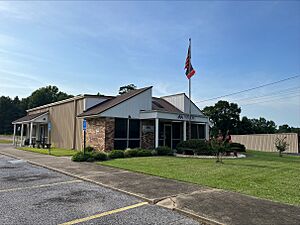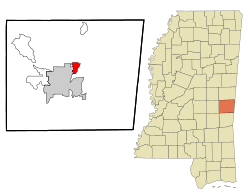Marion, Mississippi facts for kids
Quick facts for kids
Marion, Mississippi
|
|||
|---|---|---|---|

Marion Town Hall and police station
|
|||
|
|||

Location of Marion, Mississippi
|
|||
| Country | United States | ||
| State | Mississippi | ||
| County | Lauderdale | ||
| Area | |||
| • Total | 3.62 sq mi (9.38 km2) | ||
| • Land | 3.61 sq mi (9.36 km2) | ||
| • Water | 0.01 sq mi (0.02 km2) | ||
| Elevation | 367 ft (112 m) | ||
| Population
(2020)
|
|||
| • Total | 1,751 | ||
| • Density | 484.50/sq mi (187.07/km2) | ||
| Time zone | UTC-6 (Central (CST)) | ||
| • Summer (DST) | UTC-5 (CDT) | ||
| ZIP code |
39342
|
||
| Area code(s) | 601 | ||
| FIPS code | 28-45160 | ||
| GNIS feature ID | 0673135 | ||
Marion is a town in Lauderdale County, Mississippi, United States. It is a suburb located northeast of Meridian, which is the main city and county seat. In 2010, about 1,479 people lived in Marion. By 2020, the population grew to 1,751.
Contents
History of Marion
The town of Marion was named after Francis Marion. He was a famous military leader known as the "Swamp Fox." Marion was once the most important town in Lauderdale County. It served as the county seat from when the county was created until after the American Civil War. This period is called the Reconstruction Era.
Early Prosperity and Growth
Before the Civil War, Marion was a busy and successful town. Many wealthy farmers, called planters, lived there. They often used enslaved African Americans to work their farms. In 1840, Marion had several businesses. These included a drugstore, two blacksmith shops, and six stores selling dry goods. There were also two schools, one for girls and one for boys. The town even had its own newspaper, called the Lauderdale Republican.
Railroad Changes and Civil War Impact
In the 1850s, a new railroad was built. This was the Mobile and Ohio Railroad. It did not go through Marion. Instead, it built a station a couple of miles away. This new spot was called McLemore's Old Field, which later became the city of Meridian.
The railroad brought big changes. Land values in Lauderdale County increased a lot. This allowed more people to buy land and enslaved people. They grew cotton and built roads. By 1860, the number of enslaved people in the county had more than doubled. This increase led to more support for leaving the United States, known as secessionism. This happened after Abraham Lincoln was elected president.
During the Civil War, in 1864, U.S. Army forces attacked Marion. General William T. Sherman led this attack. They destroyed the railroad that connected Marion to Meridian. After the war ended, Meridian grew very quickly. In 1870, people voted to move the county seat from Marion to Meridian.
Geography of Marion
Marion is located in the middle of Lauderdale County. It is surrounded by the city of Meridian on its north, west, and south sides. Downtown Meridian is about 5 miles southwest of Marion.
Roads and Waterways
U.S. Route 45 runs along the east side of Marion. This is a four-lane highway that goes around Meridian. The highway continues north from Marion for about 83 miles to Columbus.
The town covers an area of about 3.6 square miles (9.38 square kilometers). Most of this area is land. Only a very small part, about 0.01 square miles (0.02 square kilometers), is water. Sowashee Creek forms the eastern border of Marion. This creek flows southwest through Meridian. It then joins Okatibbee Creek, which is part of the Chickasawhay River system. Eventually, the water flows into the Pascagoula River.
Population of Marion
| Historical population | |||
|---|---|---|---|
| Census | Pop. | %± | |
| 1880 | 347 | — | |
| 1980 | 771 | — | |
| 1990 | 1,359 | 76.3% | |
| 2000 | 1,305 | −4.0% | |
| 2010 | 1,479 | 13.3% | |
| 2020 | 1,751 | 18.4% | |
| U.S. Decennial Census | |||
2020 Census Information
The 2020 United States Census counted 1,751 people living in Marion. There were 667 households and 436 families in the town.
The table below shows the different racial groups living in Marion according to the 2020 census:
| Race | Number of People | Percentage |
|---|---|---|
| White | 684 | 39.06% |
| Black or African American | 922 | 52.66% |
| Asian | 40 | 2.28% |
| Pacific Islander | 2 | 0.11% |
| Other/Mixed | 44 | 2.51% |
| Hispanic or Latino | 59 | 3.37% |
Climate in Marion
Marion has a type of weather called a humid subtropical climate. This means the area has hot and humid summers. The winters are usually mild to cool. On climate maps, this type of climate is often shown as "Cfa."
Notable People
- Oscar Lee Gray: He was a member of the United States House of Representatives from 1915 to 1919. This means he was a politician who helped make laws for the country.
See also
 In Spanish: Marion (Misisipi) para niños
In Spanish: Marion (Misisipi) para niños
 | William L. Dawson |
 | W. E. B. Du Bois |
 | Harry Belafonte |




